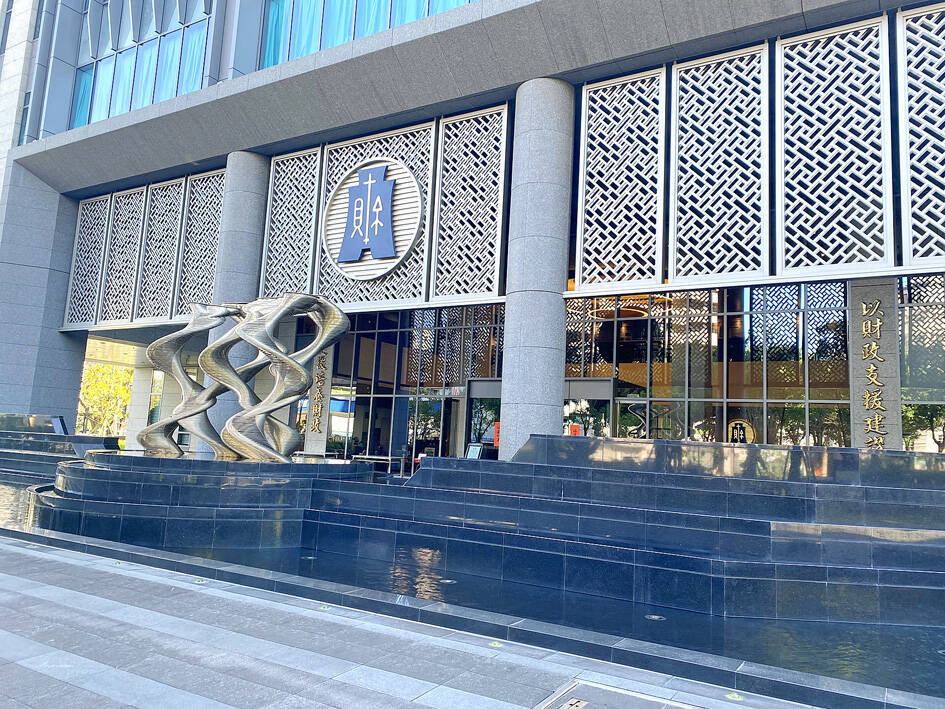The nation’s tax revenue last month rose 24.9 percent year-on-year to NT$165.4 billion (US$5.36 billion) on the back of hefty gains from corporate and personal income taxes, even though income from stock and property transaction taxes declined, the Ministry of Finance said yesterday.
Corporate income tax revenue spiked 38.7 percent annually to NT$14.7 billion, as major Taiwanese companies posted sharp improvements in monthly earnings, the ministry said.
Corporate tax revenue is likely to beat the budget for this year, despite growing economic uncertainty, it said.

Photo: Clare Cheng, Taipei Times
Similarly, personal income tax revenue soared 66.8 percent to NT$91.5 billion, as cash dividends and capital gains taxes from property transactions continued to lend support, the ministry said.
For the first eight months of the year, personal income tax revenue totaled NT$125.7 billion, a solid pickup of 32 percent from the same time last year, the ministry’s data showed.
By contrast, tax revenue from securities trading plunged 42.3 percent year-on-year after daily turnover shrank from NT$497.5 billion to NT$438.2 billion, the ministry said.
Cumulative securities transaction tax revenue in the first eight months amounted to NT$123.5 billion, down 36.7 percent from a year earlier and is unlikely to meet the annual target amid the gloomy sentiment, it said.
Economic uncertainty also affected land value increment tax revenue, which stood at NT$7.3 billion last month, a 12.6 percent drop from a year earlier, the ministry said, adding that the number of taxable cases decreased 4.2 percent year-on-year to 44,006 last month.
Overall tax revenue from January to last month reached NT$2.26 trillion, growing 16.8 percent from a year earlier and meeting 83 percent of the government’s annual target.
“The chance is high that we might see another year of revenue surplus,” the ministry said.

AI SERVER DEMAND: ‘Overall industry demand continues to outpace supply and we are expanding capacity to meet it,’ the company’s chief executive officer said Hon Hai Precision Industry Co (鴻海精密) yesterday reported that net profit last quarter rose 27 percent from the same quarter last year on the back of demand for cloud services and high-performance computing products. Net profit surged to NT$44.36 billion (US$1.48 billion) from NT$35.04 billion a year earlier. On a quarterly basis, net profit grew 5 percent from NT$42.1 billion. Earnings per share expanded to NT$3.19 from NT$2.53 a year earlier and NT$3.03 in the first quarter. However, a sharp appreciation of the New Taiwan dollar since early May has weighed on the company’s performance, Hon Hai chief financial officer David Huang (黃德才)

The Taiwan Automation Intelligence and Robot Show, which is to be held from Wednesday to Saturday at the Taipei Nangang Exhibition Center, would showcase the latest in artificial intelligence (AI)-driven robotics and automation technologies, the organizer said yesterday. The event would highlight applications in smart manufacturing, as well as information and communications technology, the Taiwan Automation Intelligence and Robotics Association said. More than 1,000 companies are to display innovations in semiconductors, electromechanics, industrial automation and intelligent manufacturing, it said in a news release. Visitors can explore automated guided vehicles, 3D machine vision systems and AI-powered applications at the show, along

FORECAST: The greater computing power needed for emerging AI applications has driven higher demand for advanced semiconductors worldwide, TSMC said The government-supported Industrial Technology Research Institute (ITRI) has raised its forecast for this year’s growth in the output value of Taiwan’s semiconductor industry to above 22 percent on strong global demand for artificial intelligence (AI) applications. In its latest IEK Current Quarterly Model report, the institute said the local semiconductor industry would have output of NT$6.5 trillion (US$216.6 billion) this year, up 22.2 percent from a year earlier, an upward revision from a 19.1 percent increase estimate made in May. The strong showing of the local semiconductor industry largely reflected the stronger-than-expected performance of the integrated circuit (IC) manufacturing segment,

COLLABORATION: Softbank would supply manufacturing gear to the factory, and a joint venture would make AI data center equipment, Young Liu said Hon Hai Precision Industry Co (鴻海精密) would operate a US factory owned by Softbank Group Corp, setting up what is in the running to be the first manufacturing site in the Japanese company’s US$500 billion Stargate venture with OpenAI and Oracle Corp. Softbank is acquiring Hon Hai’s electric-vehicle plant in Ohio, but the Taiwanese company would continue to run the complex after turning it into an artificial intelligence (AI) server production plant, Hon Hai chairman Young Liu (劉揚偉) said yesterday. Softbank would supply manufacturing gear to the factory, and a joint venture between the two companies would make AI data